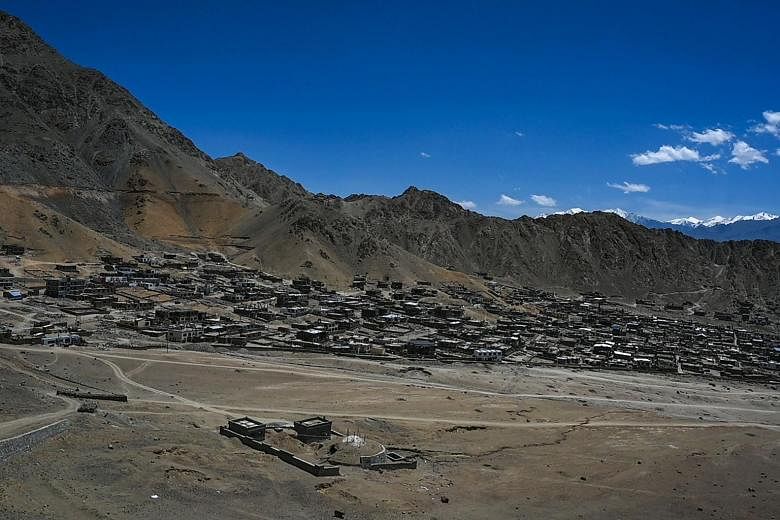BEIJING (BLOOMBERG, REUTERS) - India and China pledged to de-escalate tensions along their disputed Himalayan border after their foreign ministers met on Thursday (Sept 10) for the first time since May when the stand-off turned deadly.
Foreign minister Subrahmanyam Jaishankar and his Chinese counterpart Wang Yi agreed that "the current situation in the border area is not in the interests of both sides", they said in a joint statement after meeting on the sidelines of the Shanghai Cooperation Organisation summit in Moscow organised by Russia.
The nations "should abide by the existing border affairs agreements and regulations, maintain peace and tranquility in the border areas, and avoid any actions that may escalate the situation," they said.
In a statement on Friday (Sept 11), the Chinese foreign ministry said China will maintain communications with India through diplomatic and military channels and commit to "restoring peace and tranquility" in their disputed border area.
Mr Wang told Mr Jaishankar that the "imperative is to immediately stop provocations such as firing and other dangerous actions that violate the commitments made by the two sides".
Mr Wang also said during the meeting that all personnel and equipment that have trespassed at the border must be moved and that frontier troops on both sides "must quickly disengage" in order to de-escalate the situation.
India and China have been increasing their troop strength along the 3,488-km border known as the Line of Actual Control since May.
The military standoff, in which gun shots were fired this week for the first time since 1975, remains unresolved despite multiple rounds of negotiations between military commanders and diplomats and two phone calls between Wang and Jaishankar.
The latest skirmishes came just days after Indian Defense Minister Rajnath Singh and his Chinese counterpart, General Wei Fenghe, agreed to ease tensions after "frank and in-depth discussions" in Moscow.
It's led to deteriorating economic ties, with India limiting Chinese investments, tightening scrutiny on visas and moving to keep Huawei Technologies Co. out of 5G networks. India last week banned 118 Chinese apps including Tencent Holdings Ltd.'s popular game PUBG Mobile Lite and payments service Alipay, following up on its June ban of several applications including ByteDance Ltd.'s viral short-video service TikTok.
Differences worsened after India, in its first offensive move since the conflict began, moved thousands of soldiers to mountain peaks to claim vantage points along the south bank of Pangong Tso - a glacial lake roughly the size of Singapore - to counter what it views as an intrusion by Chinese forces.
The decision to capture high ground that was previously unoccupied revived tensions that had cooled since June when 20 Indian soldiers and an unknown number of Chinese troops were killed in brutal hand-to-hand combat.
"The two foreign ministers agreed that as the situation eases, the two sides should speed up the completion of new mutual trust-building measures to maintain and enhance peace and tranquility in the border area," they said in the joint statement.
China's Global Times, an influential tabloid published by the official newspaper of China's ruling Communist Party, said in an editorial published late Thursday that any talks with India should be paired with "war readiness".
"The Chinese side must be fully prepared to take military action when diplomatic engagement fails, and its frontline troops must be able to respond to emergencies, and be ready to fight at any time," the newspaper said.
"India has an abnormal confidence in confronting China. It does not have enough strength. If India is kidnapped by extreme nationalist forces and keeps following its radical China policy, it will pay a heavy price."

